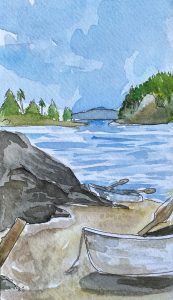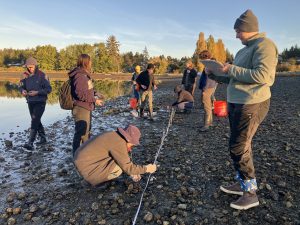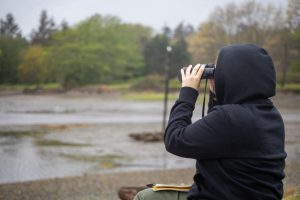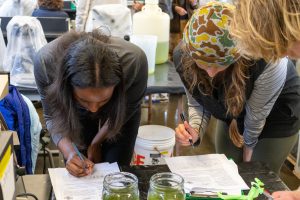HSTAA/AIS 311, FHL 375, FHL 403, FHL 420/BIOL 410, FHL 480, FHL 490 | Spring 2026
Spring Marine Studies Program 2026
Credits: 15-16
Instructor(s): Dr. Joshua Reid , Dr. Deborah Giles , Dr. Marjorie Wonham , Dr. Emily Carrington
Prerequisites: See individual courses for specific prerequisites and equivalent knowledge
Spring Marine Studies (SMS) hosts six courses for students to choose from for a full quarter of 15 to 16 credits. All enrolled students are required to live on the Friday Harbor Labs campus, which is located on San Juan Island (around a 4 hour trip via car and ferry from Seattle). Direct all questions to FHL’s Academic Services Manager at fhlstudents@uw.edu.
This year, we are pleased to offer a suite of interdisciplinary courses in the Spring Marine Studies program. Students who may not have a science background but are enthusiastic and excited to challenge themselves in topics that may not be within their major are encouraged to apply. All applications will be reviewed.
Click on the courses below to learn more.
Indigenous History and Environment of the Salish Sea (HSTAA/AIS 311, 5 credits)
Instructor: Dr. Joshua Reid, Associate Professor of American Indian Studies, University of Washington, Department of History and American Indian/Native American Studies
This course blends lectures, guest speakers, seminar-style discussions, and field trips to uncover the Indigenous history and environment of the Salish Sea. It begins with “The Distant Past,” a unit that examines the oceanographic and natural features of the region, along with the diverse Native peoples who knew these waters by many names and encountered non-Native outsiders who arrived in the late-eighteenth and early-nineteenth centuries. Then it moves into a unit on “The Historic Opportunities and Challenges on the Salish Sea,” which includes topics on treaty-making in the settler-colonial spaces of Washington Territory and British Columbia, competition over fishing sites, opportunities for labor and travel, the Fish Wars of the 1960s and 1970s, and the hardening boundaries across the Salish Sea. The final unit, “The Contemporary Salish Sea,” takes a case study approach as we examine recent marine pollution and indigenous efforts at restoring salmon runs and Native technologies and practices that support a more sustainable future for the Salish Sea.
UW students enrolled in this course will receive Social Science (SSc) and Diversity (DIV) credits through the UW History Department.
Marine Mammals of the Salish Sea (FHL 375, 5 Credits)
Instructor: Dr. Deborah Giles, Killer Whale Scientist at The SeaDoc Society and Resident Scientist at the University of Washington’s Friday Harbor Labs
The Salish Sea provides the ideal backdrop to study marine mammals. This course will provide students new to the biological sciences an opportunity to learn about the wide variety of marine mammals found here and the ecosystems that support them. This course focuses on the biology and conservation of marine mammals, their habitats and the key processes that created them. Discussions will include various topics of marine mammal science and conservation including: taxonomy, morphology including adaptations for marine realm, behavior (feeding strategies, social interactions, reproduction, etc.), habitat use and range, acoustics, anthropogenic impacts, and management of threatened or endangered animals. Students will be taught how to collect marine mammal data such as behavior and population estimates, and may also participate in necropsies. There will be several field trips, both land based and boat based, focused on observing marine mammals in their natural habitats. Students should be prepared to walk/hike while on land-based field trips and be prepared to conduct field observations in inclement weather.
Prerequisites and topics covered in those courses are listed below. Course prefixes and numbers are in accordance with the UW Seattle system. We welcome non-UW applicants as well as interdisciplinary applicants.
- BIOL 180: Mendelian genetics, evolution, biodiversity of life forms, ecology, and conservation biology (introductory biology)
- FISH/BIOL/OCEAN 250: physical, biological, and social aspects of the marine environment – oceanography, ecology, physiology, behavior, conservation, fisheries, exploration, and activism (introductory marine science)
- ENVIR 100: ethical, political, social, and scientific dimensions of environmental issues
- OCEAN 200: relationships and interactions at macro-, meso-, and microscales in the ocean
Questions about prerequisites/eligibility to take this course? Contact the Academic Services Manager at fhlstudents@uw.edu.
UW Marine Biology majors enrolled in this course will receive biodiversity elective credit.
Novel Marine Ecosystems (FHL 403, 5 credits)
Instructor: Dr. Marjorie Wonham, associate teaching professor at the University of Washington
In Novel Marine Ecosystems students will conduct field- and lab-based research to study the real-time dynamics of novel and hybrid marine ecosystems as they emerge through biotic changes (species deletions and additions) and abiotic changes. In discussions and other activities we will explore the concepts of how and why these ecosystems are forming, how ecological theory and research can help us understand them, and what conservation and management challenges and solutions they offer. In this Integrative Field Experience (IFE) course, students will be expected to apply their knowledge and skills from other courses to the focal questions in this one. Readings will be peer-reviewed journal articles and book chapters.
Prerequisites and topics covered in those courses are listed below. Course prefixes and numbers are in accordance with the UW Seattle system. We welcome non-UW applicants as well as interdisciplinary applicants.
- FISH/OCEAN/BIOL 250, OCEAN 200, or OCEAN 201: Introductory marine sciences
- OCEAN 210: Fundamentals of ocean science
- MARBIO 305: Communications
- Q SCI 381 or STAT 311: Statistics
- 3 upper-division marine science courses
Recommended prerequisites: background in marine ecology; evolution; and ecosystems and organisms
Questions about prerequisites/eligibility to take this course? Contact the Academic Services Manager at fhlstudents@uw.edu.
No textbook is required for this course.
UW students enrolled in this course will earn (W) credit.
UW students enrolled in FHL 403 are eligible to apply to the Mary Gates Endowment through FHL.
UW Marine Biology majors enrolled in this course are eligible to earn integrative field experience (IFE) credit or ecology & ecosystems credit.
Marine Ecology of the Salish Sea (FHL 420/BIOL 410, 5 credits)
Instructor: Dr. Emily Carrington, Professor at the University of Washington

This is a field-oriented study of the ecology of the Salish Sea. Students will relate ecological concepts about the structure and function of coastal ecosystems learned in lecture to first-hand observations in the field and lab. The field trips focus on observing ecological patterns of dominant organisms in different ecosystems found throughout the Salish Sea, while lab activities examine the various life history strategies of representative marine species, illustrating how different stages of an organism’s life cycle change over time, can span different biomes, and are influenced by interactions with the environment and other species. The course emphasizes observational rather than experimental methods and develops descriptive and quantitative techniques to explore how coastal ecosystems change over time and location, a core concept in marine ecology.
Prerequisites and topics covered in those courses are listed below. Course prefixes and numbers are in accordance with the UW Seattle system. We welcome non-UW applicants as well as interdisciplinary applicants.
- FISH/OCEAN/BIOL 250: physical, biological, and social aspects of the marine environment – oceanography, ecology, physiology, behavior, conservation, fisheries, exploration, and activism (introductory marine science)
OR
- BIOL 356: Foundations in ecology
PENDING: UW students enrolled in FHL 420/BIOL 410 are eligible to apply to the Mary Gates Endowment through FHL.
UW Marine Biology majors enrolled in this course are eligible to earn ecology & ecosystems credit.
Professional Portfolio in Marine Science (FHL 480, 5 credits)
Instructor: Dr. Marjorie Wonham, associate teaching professor at the University of Washington
How will you incorporate marine biology into your future? You’ve invested in your education and acquired a unique combination of knowledge and skills and interests. How do you now synthesize, integrate, and articulate what you have learned – and more importantly how and why you learn – for yourself and for future graduate programs and employers? In this course you will build an e-portfolio that reflects your academic development and builds your professional future. You will gain a deeper understanding of the core values and ideals that motivate you, acquire a suite of tools for aligning your personal and professional principles, showcase your moments of most transformative learning, and write research, grant, or fellowship pitches and proposals. You will be able to select items from this e-portfolio to highlight in future conversations about who you are, what you do, and why you do it. If knowledge is power, knowledge about knowledge is the super-power you will develop in this course.
Required prerequisites: any three 300-level courses
UW Marine Biology majors enrolled in this course are eligible to earn Other Electives credit.
Marine Sciences Seminar (FHL 490, 1 credit)
Instructor: TBD
There will be one lecture per week by research scientists. The topics will cover different fields of research. Participation is obligatory for registered students wanting to gain credits, but all students are encouraged to attend.
No textbook required.
UW Marine Biology majors enrolled in this course are eligible to earn Other Electives credit.



